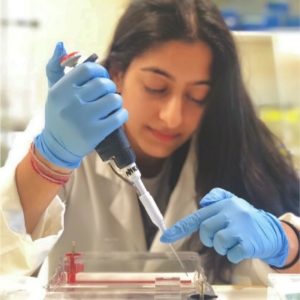About me
I studied my undergraduate degree in Biomedical Science at Sheffield Hallam University, during which I completed a placement year at the Sheffield Institute for Translational Neuroscience (SITraN) in Dr Guillaume Hautbergue’s lab. Shortly after, I was invited back to complete my undergraduate research project which was based on characterising a novel biological function of the metabolic energy regulator protein, PGC-1alpha, in a standard human kidney cell model used widely in laboratories. I went on to complete my MSc in Translational Neuroscience at Imperial College London and I am now undertaking a PhD in Neuroscience with Dr Guillaume Hautbergue, which involves further characterising PGC-1alpha’s novel biological function in stem cells modelling some aspects of ageing and in specialised nerve cells in which PGC-1alpha plays critical roles.
This PhD project is in collaboration with Professor Heather Mortiboys, Professor Ilaria Bellantuono, and a world leading mitochondrial drug-discovery company, Nanna Therapeutics.
My research
The generation of energy in organs, and the adaptation of energy demands in response to physical activities is critical to our daily function and health and is orchestrated by cells – the basic building blocks of the human body. As we age, our cells’ ability to keep up with energy demands becomes impaired, which is also seen in some neurodegenerative and metabolic disorders. A protein called PGC-1alpha is central to the control of this metabolic response as it is required to make the constituents of mitochondria, the organelle responsible for energy production. PGC-1alpha levels and therefore energy production are suggested to be decreased as we age, as well as in neurodegenerative disease. Recent research by members of my lab revealed a novel biological role of PGC-1alpha that has not been previously investigated. Research showed that PGC-1alpha is involved in transporting the code (known as messenger RNA) from the nucleus (where the code is copied from DNA) into the cytoplasm, where the mitochondrial subunits are manufactured.
My project now aims at investigating the relevance of the novel RNA transport function and measuring the amounts of PGC-1alpha in specialised human cells in which it plays critical roles. In particular, I will conduct my studies in nerve cells which were derived from young and old individuals as well as in stem cells which model senescence, a process related to ageing. Moreover, I will be testing whether mitochondrial-boosting compounds developed by Nanna Therapeutics modulate the molecular functions of PGC-1alpha, its associated biological processes, and improve the health or survival/longevity of old nerve or senescent cells. Viral-based gene therapy approaches to increase the amounts of PGC-1alpha or alter the functions of PGC-1alpha will be used in parallel to treatments with compounds to dissect the mechanisms which boost mitochondrial function and evaluate the potential efficacy of these interventions, which may be used in the future as novel therapeutic strategies.
The research is principally based in SITraN at the University of Sheffield; however, it will also involve an exciting opportunity to undertake a 3-month industrial placement at Nanna Therapeutics.
Contact
LinkedIn: https://www.linkedin.com/in/nikita-soni
Twitter: https://twitter.com/Nikita31_

